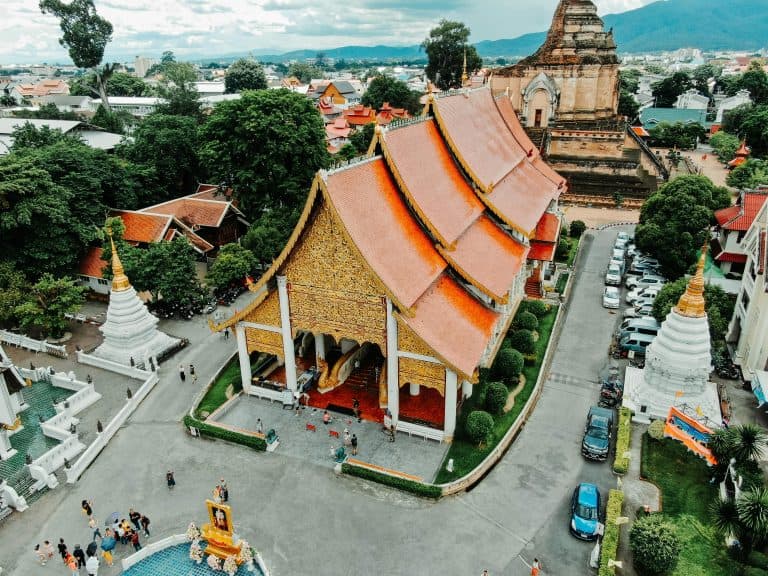The Ultimate Guide to Staying in Thailand: Visa Requirements and Extensions Explained
Thailand is a beautiful country with a rich cultural heritage that attracts millions of tourists every year. From stunning beaches to delicious cuisine, there’s no shortage of things to see and do. However, if you’re planning on staying in Thailand for an extended period, you’ll need to understand the visa requirements and extensions. As a digital marketer who has spent considerable time in Thailand, I have gained valuable insight into the visa process, and I’m excited to share my knowledge with you. In this ultimate guide, we will cover everything you need to know about staying in Thailand, from visa requirements and extensions to the best places to live and work. Whether you’re planning on staying for a few months or a few years, this guide will equip you with all the information you need to make your stay in Thailand as smooth and hassle-free as possible. So, let’s dive in!
Visa requirements for Thailand
Before you travel to Thailand, it’s essential to know the visa requirements. Depending on your nationality and the purpose of your visit, you may need a visa to enter the country. Thailand offers different types of visas that cater to various needs. It’s crucial to understand which visa you need to avoid any complications when entering the country.
There are several ways to enter Thailand, but the most common ones are by air, land, and sea. If you’re flying to Thailand, you’ll need to fill out a departure card and an arrival card. These cards are usually handed out on the plane, but if not, you can find them in the arrival hall at the airport.
If you’re entering Thailand via land, you’ll also need to fill out an arrival card, which is available at the border checkpoint. You’ll also need to present your passport, and if you’re staying for more than two weeks, you’ll need a visa.
Types of visas for Thailand
Thailand offers various types of visas, depending on the purpose of your visit. Here are the most common types of visas for Thailand:
Tourist visa
The tourist visa is the most popular visa for people who want to visit Thailand for a short period. The visa is valid for 60 days and can be extended for another 30 days. You can apply for the tourist visa at a Thai embassy or consulate in your home country or neighboring countries.
Non-immigrant visa
The non-immigrant visa is for people who want to stay in Thailand for a more extended period than the tourist visa allows. You can apply for the non-immigrant visa if you’re planning to work, study, or do business in Thailand. The non-immigrant visa is valid for 90 days and can be extended for up to a year.
Education visa
The education visa is for people who want to study in Thailand. To be eligible for an education visa, you need to enroll in a language school or university in Thailand. The education visa is valid for 90 days and can be extended for up to a year.
Work visa
The work visa is for people who want to work in Thailand. To be eligible for a work visa, you need to have a job offer from a Thai company. The work visa is valid for 90 days and can be extended for up to a year.
Retirement visa
The retirement visa is for people who want to retire in Thailand. To be eligible for a retirement visa, you need to be over 50 years old and have a minimum of 800,000 baht in a Thai bank account or a monthly income of at least 65,000 baht. The retirement visa is valid for one year and can be extended every year.
Tourist visa requirements and extension process
If you’re planning on staying in Thailand for less than 60 days, you can apply for a tourist visa. Here are the requirements for a tourist visa:
- A valid passport with at least six months’ validity
- A completed tourist visa application form
- Two passport photos
- Proof of onward travel (e.g., return ticket)
- Proof of accommodation (e.g., hotel booking)
Once you have all the necessary documents, you can apply for a tourist visa at a Thai embassy or consulate in your home country or neighboring countries. The visa processing time usually takes 2-3 business days.
If you’re already in Thailand and want to extend your tourist visa, you can do so at an immigration office. Here are the requirements for a tourist visa extension:
- A completed visa extension application form
- A copy of your passport
- A copy of your departure card
- A passport photo
- The visa extension fee (1,900 baht)
You can extend your tourist visa for up to 30 days at an immigration office in Thailand.
Non-immigrant visa requirements and extension process
If you’re planning on staying in Thailand for more than 60 days, you can apply for a non-immigrant visa. Here are the requirements for a non-immigrant visa:
- A valid passport with at least six months’ validity
- A completed non-immigrant visa application form
- Two passport photos
- Proof of onward travel (e.g., return ticket)
- Proof of accommodation (e.g., hotel booking)
- A letter from your employer or educational institution in Thailand
Once you have all the necessary documents, you can apply for a non-immigrant visa at a Thai embassy or consulate in your home country or neighboring countries. The visa processing time usually takes 2-3 business days.
If you’re already in Thailand and want to extend your non-immigrant visa, you can do so at an immigration office. Here are the requirements for a non-immigrant visa extension:
- A completed visa extension application form
- A copy of your passport
- A copy of your departure card
- A passport photo
- The visa extension fee (1,900 baht)
- A letter from your employer or educational institution in Thailand
You can extend your non-immigrant visa for up to a year at an immigration office in Thailand.
Education visa requirements and extension process
If you’re planning on studying in Thailand, you can apply for an education visa. Here are the requirements for an education visa:
- A valid passport with at least six months’ validity
- A completed education visa application form
- Two passport photos
- Proof of enrollment in a language school or university in Thailand
- Proof of accommodation (e.g., hotel booking)
- A letter from the school or university in Thailand
Once you have all the necessary documents, you can apply for an education visa at a Thai embassy or consulate in your home country or neighboring countries. The visa processing time usually takes 2-3 business days.
If you’re already in Thailand and want to extend your education visa, you can do so at an immigration office. Here are the requirements for an education visa extension:
- A completed visa extension application form
- A copy of your passport
- A copy of your departure card
- A passport photo
- The visa extension fee (1,900 baht)
- A letter from the school or university in Thailand
You can extend your education visa for up to a year at an immigration office in Thailand.
Work visa requirements and extension process
If you’re planning on working in Thailand, you can apply for a work visa. Here are the requirements for a work visa:
- A valid passport with at least six months’ validity
- A completed work visa application form
- Two passport photos
- Proof of employment from a Thai company
- Proof of accommodation (e.g., hotel booking)
– A letter from the employer in Thailand
Once you have all the necessary documents, you can apply for a work visa at a Thai embassy or consulate in your home country or neighboring countries. The visa processing time usually takes 2-3 business days.
If you’re already in Thailand and want to extend your work visa, you can do so at an immigration office. Here are the requirements for a work visa extension:
- A completed visa extension application form
- A copy of your passport
- A copy of your departure card
- A passport photo
- The visa extension fee (1,900 baht)
- A letter from the employer in Thailand
You can extend your work visa for up to a year at an immigration office in Thailand.
Retirement visa requirements and extension process
If you’re planning on retiring in Thailand, you can apply for a retirement visa. Here are the requirements for a retirement visa:
- A valid passport with at least six months’ validity
- A completed retirement visa application form
- Two passport photos
- Proof of retirement (e.g., pension certificate)
- Proof of accommodation (e.g., hotel booking)
– A bank statement showing a minimum balance of 800,000 baht or a monthly income of at least 65,000 baht.
Once you have all the necessary documents, you can apply for a retirement visa at a Thai embassy or consulate in your home country or neighboring countries. The visa processing time usually takes 2-3 business days.
If you’re already in Thailand and want to extend your retirement visa, you can do so at an immigration office. Here are the requirements for a retirement visa extension:
- A completed visa extension application form
- A copy of your passport
- A copy of your departure card
- A passport photo
- The visa extension fee (1,900 baht)
- A bank statement showing a minimum balance of 800,000 baht or a monthly income of at least 65,000 baht.
You can extend your retirement visa every year at an immigration office in Thailand.
Tips for staying in Thailand
Now that you know everything about the visa requirements and extensions, here are some tips for staying in Thailand:
- Learn some Thai phrases to communicate with the locals
- Respect the culture and customs of Thailand
- Try the local cuisine
- Use public transportation to save money
- Take advantage of the low cost of living in Thailand
Common mistakes to avoid when staying in Thailand
Staying in Thailand can be an incredible experience, but there are some common mistakes you should avoid:
- Overstaying your visa
- Not carrying your passport with you at all times
- Taking part in illegal activities
- Not respecting the local culture
- Not learning about the visa requirements and extensions
Conclusion and additional resources
Staying in Thailand can be an incredible experience, but it’s essential to understand the visa requirements and extensions to avoid any complications. In this ultimate guide, we covered everything you need to know about staying in Thailand, from the types of visas to the extension process. We also provided some tips and common mistakes to avoid when staying in Thailand. If you want to learn more about staying in Thailand, here are some additional resources:
– The official website of the Thai embassy or consulate in your home country
– The official website of the Thai immigration bureau
– Online forums and groups for expats living in Thailand
Remember, staying in Thailand can be an incredible experience, but it’s crucial to do your research and understand the visa requirements and extensions to avoid any complications.





